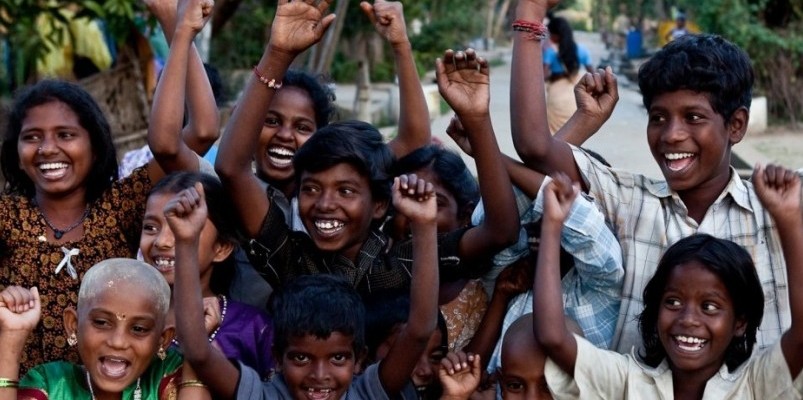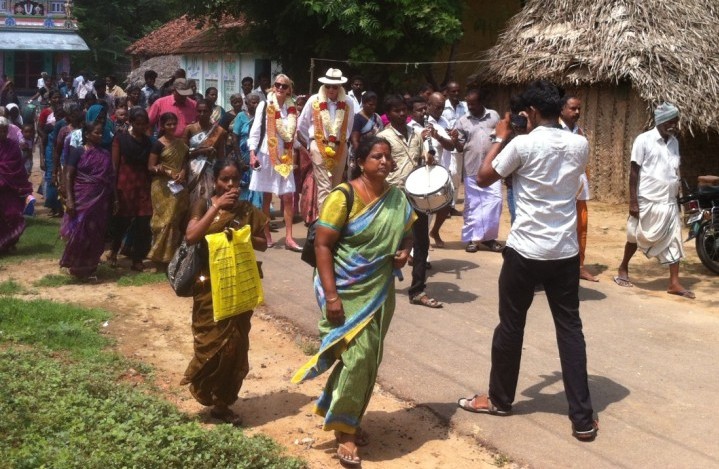
Postcard from Vikrapandiam
In October 2014, Ulla Zachrisson and Bo Söderberg visited Vikrapandiam, a rural Indian village they’d sponsored two years earlier. Ulla describes the experience here in her own words
We left Chennai and drove through at least 10 villages that looked like many we’d seen before outside New Delhi and around Mumbai. People sitting, standing and doing nothing. No smiles, naked children covered in dirt, waste everywhere. I suppose you’d call it apathy. And poverty, of course.
Then we came to our village. I couldn’t have imagined in my wildest fantasy the welcome we got. They’d prepared for our arrival, probably for weeks. The children were standing in their beautiful school uniforms. There was a band waiting for us with two drummers, a clarinetist and a trumpet player. There was noise all over, and they dressed us in big flower-necklaces. Everyone in the village seemed to be there, all 1,800 of them, except for a group of holy men we met later who were apparently unaware of anything: ‘Oh, what are you doing here?’
‘You could see they believed in themselves. They were so proud that they’d been able to create all this.’
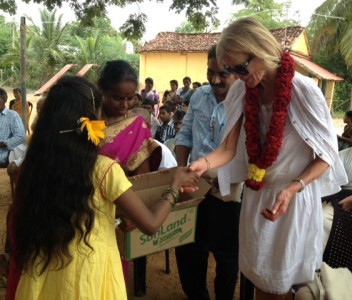 We did a tour of the village with the band leading the way. They’d never had visitors before and most had never left, so this was the first time they’d seen Westerners. The girls especially wanted to touch my cheek – was it plastic or what? – and compare the colour of our arms and hair. We must have looked very funny.
We did a tour of the village with the band leading the way. They’d never had visitors before and most had never left, so this was the first time they’d seen Westerners. The girls especially wanted to touch my cheek – was it plastic or what? – and compare the colour of our arms and hair. We must have looked very funny.
So much had been done in the two years since I’d received my first village report. I thought, ‘My God, did the donation really mean so much?’ They’d gone from having no schools, no education at all, to reaching full attendance in primary and middle school – that’s for 5- to 13-year-olds – and building an after-school learning centre with a computer where kids got help doing their homework. They’d also built a daycare centre so mothers with young children could work during the day, and arranged to have older children attend high school in a nearby village.
‘We joked that when you’re going to the toilet you say, “I’m going to Ulla!”’
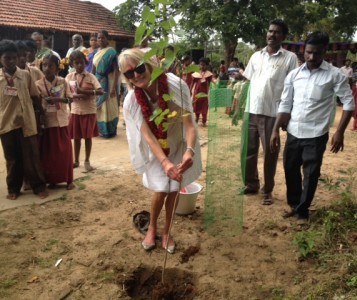 The adults had all kinds of micro-companies: industrial sewing, goat feeding, agriculture. There were huge rice fields that before had been much smaller. And almost every household had its own kitchen garden with cucumbers, carrots, beetroots and all kinds of herbs. You could see they believed in themselves. They were so proud that they’d been able to create all this.
The adults had all kinds of micro-companies: industrial sewing, goat feeding, agriculture. There were huge rice fields that before had been much smaller. And almost every household had its own kitchen garden with cucumbers, carrots, beetroots and all kinds of herbs. You could see they believed in themselves. They were so proud that they’d been able to create all this.
I was also impressed they’d built five toilets, water toilets, and dug three wells. The ladies’ toilets were labelled ‘Ulla Zachrisson’ and the men’s ‘Bo Söderberg’. We joked that when you’re going to the toilet you say, “I’m going to Ulla!” There was also electricity in every household, at least one low-energy lamp, and water-purifying machines – one for the village and one for the school.
Because of my background in medicine I’d asked if I could donate more to sponsor a health component, too. At the start of the programme they found around 80 women with anaemia. By the end, using a combination of iron tablets, herbs from kitchen gardens and other changes in nutrition, there was only one woman left with mild anaemia. They’d also started cataract treatments and launched a vaccination program inoculating everyone in the village against polio and measles.
It was important to see our donation had gone directly to the village, that it had made such a big difference. It’s actually a small of money compared to its enormous impact. The day ended with a tree planting ceremony. It was one of the best days of my life.
As told to Hand in Hand International
Speak to Ulla about her experience
Vikapandiam, Tamil Nadu, India
Find out more about our Village Uplift Program
Contact us
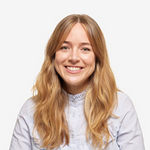
Private donors
Charlie Strawa Fundraising ManagerCharlie has worked in the not-for-profit sector for nine years, building strategic relationships with individuals and organisations to meet their philanthropic objectives and drive societal change.
cstrawa@hihinternational.orgTel: +44 (0)207 5091
Leave your details and a time to call back and we'll take care of the rest

